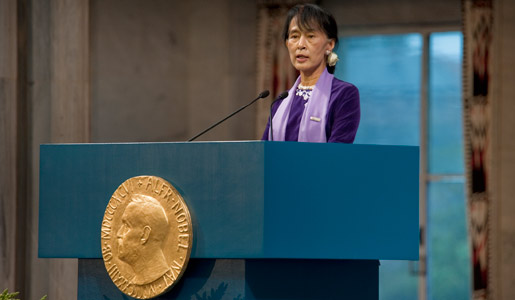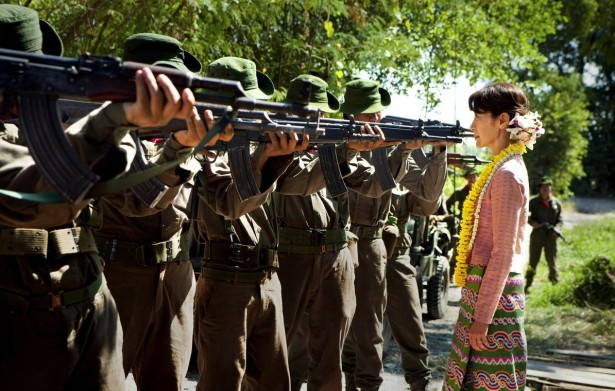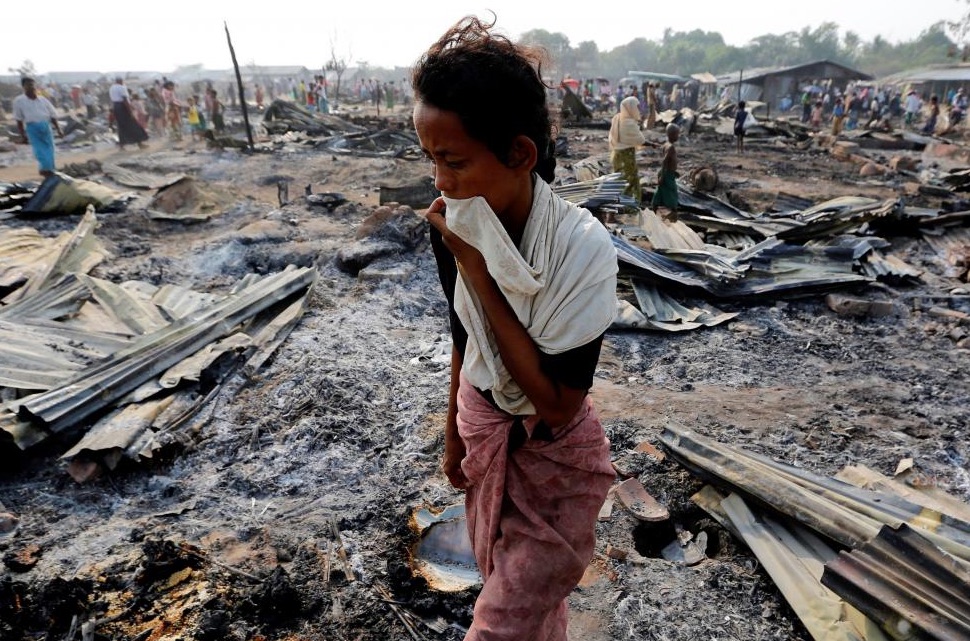A brief history of Aung San Suu Kyi: a Nobel ill-deserved?
Published: 2017-09-06 13:05
Last Updated: 2024-04-26 17:52
Recent developments in the Rohingya crisis show the government of Myanmar laying landmines across a section of its border with Bangladesh over the past three days, according to government sources in Dhaka. Government sources believe landmines are planted to prevent the return of Rohingya Muslims fleeing persecution.
Myanmar’s Rohingya Muslims community has been facing military crackdowns since 1978, which some UN agencies state qualifies as ‘ethnic cleansing’ or even ‘genocide’. Myanmar’s de facto leader - Aung Sun Suu Kyi, has been facing mounting criticism over silence of Burmese violence towards the stateless Rohingya community.
Aung Sun Suu Kyi received the Nobel Peace Prize in 1991, with critics recently calling for the title to be revoked due to her failure to uphold the same principals she fought for in the current crisis.

How Aung Sun Suu Kyi went from champion of democratic rights and ending Myanmar’s junta rule, to international backlash for failure to uphold the same principals, is an interesting turn of events.
Suu Kyi’s life is riddled with political persecution. Her father is known as the architect of then-Burma’s independence from British colonial rule. Suu Kyi was a communist and then social democratic leader who was assassinated six months prior to independence, in 1947 right before the country was granted independence.
At the age of 15, Aung Sun Suu Kyi left Burma along with her siblings for India, after her mother was appointed as an ambassador to the country. Afterwards, she left for the UK which was the become her home, while democratic Burma came under junta rule in 1962.
The coup resulted in large-scale corruption, isolation from the international community, and perpetual crackdowns on any opposition parties to junta rule.
In 1988, Aung Sun Suu Kyi returned to Burma to care for her sick mother, at which point she made a political stand. Massive protests took place known as the ‘8888 Uprising’, which resulted in over 2 million protestors taking the streets nationwide, and 3-10 thousand deaths.
Suu Kyi was moved by her people’s struggle, and began making political speeches heavily inspired by Gandhi's ideology of nonviolence, Buddhist concepts of peace, and democratization. One particular speech saw half a million people listening to Suu Kyi’s call for the democratization of Burma and an end to junta rule.
She was subsequently placed under house arrest, noted by the government as a threat for her name and charismatic speaking. Despite being under house arrest, Suu Kyi continued giving speeches from her own backyard, with a megaphone standing on a podium above the fence.

The government eventually conceded, and hosted elections in 1990 expecting to win. Suu Kyi’s National League for Democracy however, won. The government responded by ordering her to remain under house arrest, and made a constitutional amendment preventing her from becoming President.
Years were spent with the government attempting to subdue her political influence, which ironically further expanded her political reach and influence. While under house arrest, she continued giving speeches over her fence, with a resolve that was noted by both Myanmar’s community and internationally.
In 1991 she was awarded the Nobel Peace Prize. She continued giving speeches under house arrest for 20 years, choosing to remain non-violent. She once stated: "I do not hold to non-violence for moral reasons, but for political and practical reasons."
In 2007 the status quo could not be upheld, after the Saffron Protests by Buddhist monks. The Burmese government cracked down on the protesting monks, and executed a Japanese photojournalist covering the events.
This lead to wide international protests, which pressured the junta government to make a series of moderate reforms which eventually lead to ending Aung Sun Suu Kyi’s house arrest in 2010, and winning the elections in 2015.
However, the government refused to lift the constitutional ban, which prevented her from becoming President, but was given the role of State Counselor, giving her the power and influence to lead the country.
A belief was held that Myanmar was finally transitioning into a democratic country, and although persecution of the Rohingya had been ongoing long before Suu Kyi gained any political influence, her refusal to advocate for their rights has not gone unnoticed.
In an interview with the BBC made this year, Suu Kyi denied any form ‘ethnic cleansing’ happening in the country, and remained largely silent.
The international community is vehemently opposed, citing sexual violence, arson, shooting and execution of women and children, and denial of human or civil rights as indicators of crimes against humanity.

She has also denied independent human rights and UN teams from entering the Rakhine state to investigate the incidents with the Rohingya. Some critics site jailing of political opposition, as well as “running her party like a dictator”.
Suu Kyi criticised international condemnation, citing a "huge iceberg of misinformation" about the conflict promoting the interests of terrorists.
It is true that armed Rohingya groups have attacked government entities, though some scholars advocate that the actions are committed out of self-defense due to decades of ongoing persecution.
She has been criticized by fellow Nobel Peace Prize laureate Malala Yousafzai for ongoing silence, with individuals calling for revoking her Nobel Prize for failing to uphold the same principals she had been advocating for decades.
The main question posed is now that Aung Sun Suu Kyi has gained her freedom, why is she refusing to use it to advance the freedom of others; particularly the most persecuted ethnic minority in the world?

